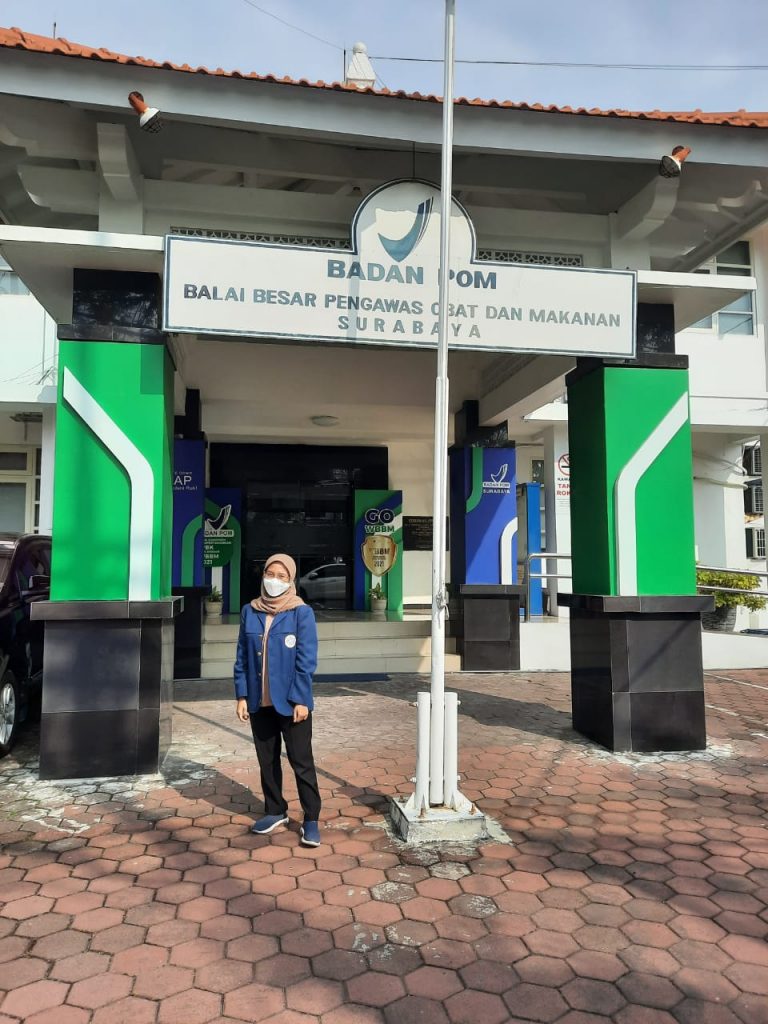UNAIR NEWS – Faradyah Lulut Santosa, a student of the Nutrition Department of the Faculty of Public Health (FKM) Universitas Airlangga (UNAIR), managed to be accepted in 126 from 1.116 applicants in the Pangan Aman Goes To Campus (PAGC) Program. The program is a part of Independent Campus (Kampus Merdeka), a synergy program between the National Agency of Drug and Food Control (BPOM), Ministry of Education, Culture, Research, and Technology (Kemendikbudristek), and universities in Indonesia.
She said that she achieved various experiences in the field of food safety.
“This program was carried out for five months, the first two months were online, and the last three months were offline. I am currently on the third month,” explained Fara when UNAIR NEWS interviewed her on Friday, May 13, 2022.
Before going directly to the field, the student in the nutrition department from 2019 class received a competency debriefing in food safety according to the Competency Standard National Working Indonesia (SKKNI). Fara stated that in the early two months, the students are grouped. This group did not only consist of students from the same department and universities.
“The first and the second months were technical training like lectures. There are pre-test and post-tests to completing a case study that each group’s mentors evaluate,” she explained.
Furthermore, in the third month, she had the chance to assist in food processing in Small-Medium Enterprises (SMEs). It includes the implementation of the Good Manufacturing Practices (GMP) in Household Industries to help obtain a distribution permission number.
“The last three months, there is a placement for each student. Thanks to God, I was placed in Surabaya,” she said.

It was not easy for Fara to manage time between lectures and internships because the credit system conversion numbers still depend on the autonomy of each study program. Even so, she can still work hand in hand.
An experience she encountered was a case of Extraordinary Events of Food Poisoning (KLB) in a village caused by a lack of sanitation cleanliness. “at that time, a house held an event, and some mothers helped the event. However, the way of processing the food was not correct. Moreover, their toilet is close to the well. So food processing mixed with the water is polluted with E-coli bacteria,” stated the nutrition student who owns the food and beverages business.
Furthermore, Fara then added that many food vendors still used dangerous ingredients such as formaldehyde, textile coloring, and borax. It means that food poisoning does not only come from expired products but also from people who cannot differentiate which are dangerous and which are not.
“From this, the question is, food unsafety came from lack of information and bad behavior. Thus, from here, education is needed,” said Fara.
From this program, Fara gave an analogy that learning on the campus is the same as swimming in a pool. In contrast, an internship is directly in touch with the community with challenges, depth, and different currents, like swimming in an open sea. Fara did not only receive work experience in BPOM, but she also received food-specific professional certification.
“Joining a certification training independently is considered expensive. This is the interesting part, learning by doing. Furthermore, it could close the gap in the industrial and university world. I was also mentored on the art of how to provide knowledge to others,” she mentioned.
Author: Viradyah Lulut Santosa
Editor: Feri Fenoria









